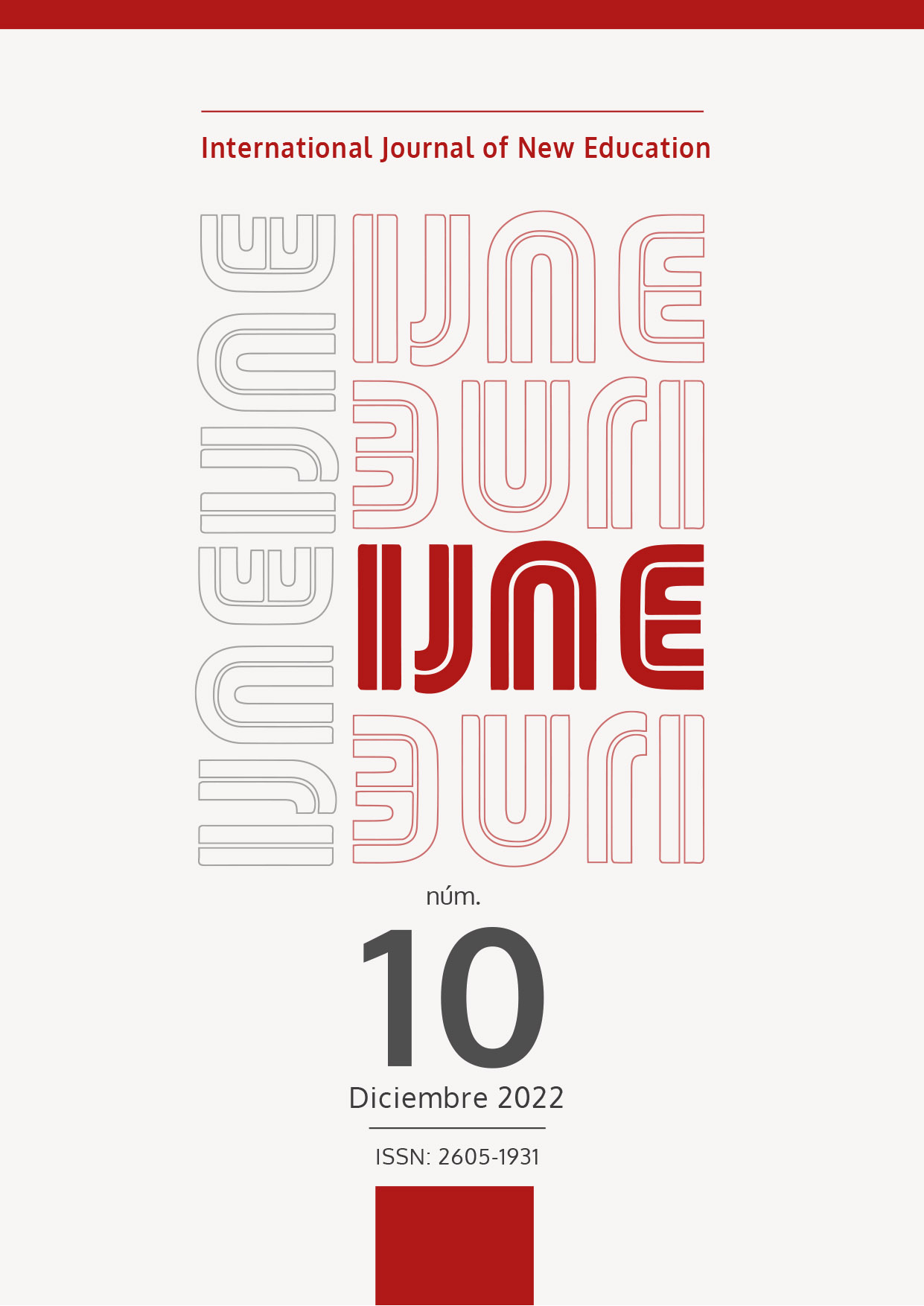Integración de las ciencias y la música para conservar el ambiente por medio del pensamiento computacional
DOI:
https://doi.org/10.24310/IJNE.10.2022.14689Palabras clave:
innovación pedagógica, aprendizaje a través de la experiencia, programación informática, educación musical, enseñanza de ciencias, formación preparatoria de docentesResumen
El artículo presenta y describe el Proyecto Code, Science & Music Remix, una experiencia educativa centrada en la problematización en el aprendizaje. El mismo fue diseñado para desarrollar el pensamiento computacional desde un enfoque de integración curricular en el contexto de los Objetivos de Desarrollo Sostenible (ODS). El proyecto tuvo como propósito principal promover el desarrollo del pensamiento computacional en estudiantes de quinto grado y en futuros maestros del nivel elemental. Como parte de las clases de ciencias se aprendió de las esferas terrestres y se implementaron los talleres de programación utilizando la plataforma de EarSketch. La plataforma busca que los participantes aprendan a programar, y desarrollen el pensamiento computacional, a la vez que expresan sus conceptualizaciones a través de la música. Esta integración de las ciencias y la música lo aplicaron en una composición musical con el propósito de concienciar en torno al ambiente. Tanto el producto musical como el proceso para lograr los objetivos el proyecto, se presentó a la comunidad escolar con el fin de educar a otros acerca de la necesidad de conservar el ambiente y vivir de forma cónsona con los ODS en beneficio de los habitantes de la Tierra.
Descargas
Métricas
Publicación Facts
Perfil de revisores N/D
Información adicional autores
Indexado: {$indexList}
-
Indexado en
- Sociedad Académica/Grupo
- N/D
- Editora:
- Universidad de Málaga
Citas
Appleton, K. (2007). Elementary science teaching. In S.K. Abell & N. G. Lederman (Eds.), Handbook of research on science education (pp. 493-536). Lawrence Erlbaum Associates, Inc.
Blume, R. (1971). Humanizing teacher education. Phi Delta Kappa International, 52(7), 411-415. https://www.jstor.org/stable/20372937
Díaz Rolón, A. (2022, April 23). Poderoso mensaje ambiental en “lenguaje musical”. El Vocero. https://www.elvocero.com/verde/medio_ambiente/poderoso-mensaje-ambiental-en-lenguaje-musical/article_50921758-c29d-11ec-92f6-67c3a4a85450.html
Dierking, L. D., Falk, J. H., Rennie, L., Anderson, D., & Ellenbogen, K. (2003). Policy statement of the “informal science education” ad hoc committee. Journal of Research in Science Teaching, 40(2), 108–111. https://doi.org/10.1002/tea.10066
Duit, R., GropengieBer, H., Kattmann, U., Komorek, M., & Parchmann, I. (2012). The model of educational reconstruction: A framework for improving teaching and learning science. In D. Jorde & J. Dillon (Eds.), Science education research and practice in Europe (pp. 13-37). Sense Publishers. https://doi.org/10.1007/978-94-6091-900-8_2
Eduteka. (2011). Definición operativa de CT para educación escolar. https://eduteka.icesi.edu.co/pdfdir/PensamientoComputacional_Definicion.pdf
Erdogan, S. C. (2019). How do prospective elementary and gifted education teachers perceive scientists and distinguish science from pseudoscience? Journal of Education in Science, Environment and Health, 5(1), 119-133. https://doi.org/10.21891/jeseh.487304
Escuela Elemental Universidad de Puerto Rico. (2022, May 5). Proyecto code, science, and music remix. https://ee.upr.edu/mod/page/view.php?id=1239&forceview=1
Feliciano Batista, J. I. (2022, April 22). EEUPR: Estudiantes conmemoran el día del planeta Tierra. Puerto Rico Post. https://puertoricoposts.com/2022/04/22/eeupr-estudiantes-conmemoran-el-dia-del-planeta-tierra/
GENÇ, M. (2013). Prospective elementary teachers’ misconceptions in biology lesson: Urinary system sample. International Journal on New Trends in Education and Their Implications, 4(3) 178-187.
International Society for Technology Education. (2022). Estándares ISTE para estudiantes. https://www.iste.org/es/standards/iste-standards-for-students
Lederman, N. G., & Lederman, J. S. (2014). Research on teaching and learning of nature of science. In N. G. Lederman & S.K. Abell (Eds.), Handbook of research on science education (Vol. 2, pp. 600- 620). Routledge.
Murray Shafer, R. (1967). Limpieza de oídos. Editorial Ricordi Americana.
Naciones Unidas. (2015). Resolución aprobada por la Asamblea General el 25 de septiembre de 2015. https://documents-dds-ny.un.org/doc/UNDOC/GEN/N15/291/93/PDF/N1529193.pdf?OpenElement
National Research Council. (2012). A framework for K-12 science education: Practices, crosscutting concepts, and core ideas. National Academies Press. https://nap.nationalacademies.org/read/13165/chapter/1
Next Generation Science Standards. (2013). Next generation science standards for states by states: Get to know the standards. https://www.nextgenscience.org/get-to-know
Notiseis360PR. (2022, April 22) Reportaje: Estudiantes de escuela elemental de la UPR presentan campaña educativa a favor del planeta. WIPR. https://wipr.pr/estudiantes-de-escuela-elemental-de-la-upr-presentan-campana-educativa-a-favor-del-planeta/
Oliveros, P. (2019). Deep listening: Una práctica para la composición sonora. EdictOràlia Música.
Piaget, J. (2019). Psicología y pedagogía: Cómo llevar adelante la teoría del aprendizaje a la práctica docente (E. Martínez Kolodens, Trans.). Siglo Veintiuno Editores. (Original work published in 1969).
Remezcla (2022). Remezcla Music & Code. https://bitly.com/remezclapr
Roberts, D., & Bybee, R. (2014). Scientific literacy, science literacy and science education. In N. G. Lederman, & S. K. Abell, Handbook of research on science education (Vol. 2, pp. 545-558). Routledge.
Velázquez Rivera, L. M., Clark Mora, L. & Quiñones Pérez, I. R. (2020). La problematización: Herramienta para facilitar el aprendizaje auténtico de las ciencias en el nivel elemental. International Journal of New Education. 6. 63-81. https://doi.org/10.24310/IJNE3.2.2020.10267
Velázquez Rivera, L. M. & Figarella García, F. (2018). La problematización en el aprendizaje: Tres estrategias para la creación de un currículo auténtico. CoopERA.
Velázquez Rivera, L. M., Figarella García, F. & Clark Mora, L. (2016). La aventura del currículo auténtico: Posibilidades y éxitos en la problematización del aprendizaje. CoopERA.
Zeidler, D. L., & Sadler, T. D. (2011). An inclusive view of scientific literacy: Core issues and future directions. In C. Linder, L. Östman, D. A. Roberts, P. O. Wickman, G. Erickson, & A. MacKinnon (Eds.), Exploring the landscape of scientific literacy (pp. 176-192). Routledge.
Publicado
Cómo citar
Número
Sección
Licencia
Las obras se publican en edición electrónica bajo una licencia Creative Commons Reconocimiento-NoComercial 4.0 España: se pueden copiar, usar, difundir, transmitir y exponer públicamente, siempre que:
a) Se cite la autoría y la fuente original de su publicación (revista,
editorial y URL de la obra.
b) No se usen para fines comerciales.
c) Se mencione la existencia y especificaciones de esta licencia de uso.
Será responsabilidad exclusiva de los autores obtener los permisos necesarios de las imágenes que estén sujetas a derechos de autor.









16.png)
